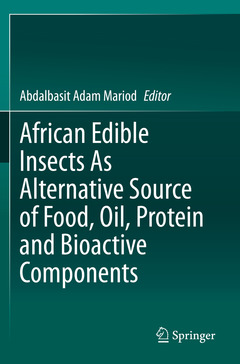African Edible Insects As Alternative Source of Food, Oil, Protein and Bioactive Components, 1st ed. 2020
Coordonnateur : Adam Mariod Abdalbasit

The harvesting, processing and consumption of edible insects is one of the main keys to the sustainability of food chains on the African continent. Insects are the largest and most successful group of animals on the planet and it is estimated that they comprise 80% of all animals. This makes edible insects extremely important to the future survival of large populations across Africa and the world. Insects offer a complete animal protein that includes all 9 essential amino acids and are very competitive with other protein sources. They are also a good source of beneficial unsaturated fats, and many insects have a perfect Omega 3:6 balance.
African Edible Insects As Alternative Source of Food, Oil, Protein and Bioactive Components comprehensively outlines the importance of edible insects as food and animal feed and the processing of insects in Africa. The text also highlights indigenous knowledge of edible insects and shows the composition and nutritional value of these insects, plus presents reviews of current research and developments in this rapidly expanding field. All of the main types of edible insects are covered, including their nutritional value, chemical makeup, and harvesting and processing details. The various preparation technologies are covered for each insect, as are their individual sensory qualities and safety aspects. A key aspect of this work is its focus on the role of insects in edible oils and gelatins. Individual chapters focus on entomophagy in Africa and the various key aspects of the continent's growing edible insect consumption market.
As it becomes increasingly clear that the consumption of insects will play a major role in the sustainability of food chains in Africa, this work can be used as a comprehensive and up-to-date singular source for researchers looking for a complete overview on this crucial topic.
2. African edible insect consumption market
3. Entomophagy in Africa
Risks of microbiological contamination and heavy metals of entomophagy
The food safety of edible insects
Interdisciplinary uses of some edible species
7. Sensory quality of edible insects
8. Preparation and processing technologies of edible insects
The legislative status of edible insects in the world rotein and gelatine
Watermelon bug as a source of edible oil, protein and gelatine
Nutrient composition of edible grasshoppers
13. Nutrient composition of Black solider fly Hermetia illucens
Nutrient composition and bioactive components of Crickets (Gryllidae)
Nutrient composition and bioactive components of ants
Nutrient composition and bioactive components of migratory locust (Locusta migratoria)
Nutrient composition and bioactive components ofMopane worm (Gonimbrasia belina)
Nutrient composition of desert locust (Schistocerca gregaria)
Nutrient composition of Gonimbrasia belina
Nutrient composition of bees and wasps
Nutrient composition of Mealworm (Tenebrio molitor)
Nutrient composition of Termites
Abdalbasit Adam Madrid is a Professor in the Indigenous Knowledge and Heritage Centre at Ghibaish College of Science & Technology in Ghibaish, Sudan.
Comprehensively outlines the importance of edible insects as food and animal feed and the processing of insects in Africa
Highlights indigenous knowledge on edible insects and shows the composition and nutritional value of these insects, plus presents reviews of current research and developments in this rapidly expanding field
Covers all of the main types of edible insects including their nutritional value, chemical makeup, and harvesting and processing details
Date de parution : 01-2021
Ouvrage de 314 p.
15.5x23.5 cm
Date de parution : 01-2020
Ouvrage de 314 p.
15.5x23.5 cm



